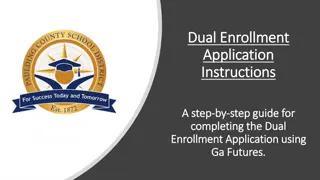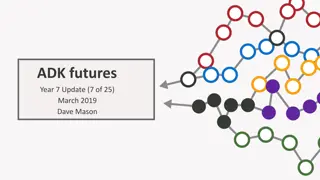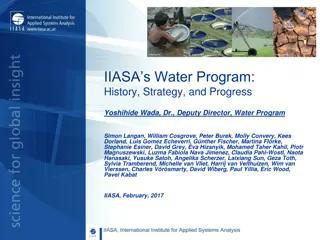
Greek Verb Future Tense Quirks
Explore the complexities of deponent futures in Greek verbs and learn how some verbs transition from active to deponent in the future tense. Discover examples and insights into building Greek verbs for the future.
Download Presentation

Please find below an Image/Link to download the presentation.
The content on the website is provided AS IS for your information and personal use only. It may not be sold, licensed, or shared on other websites without obtaining consent from the author. If you encounter any issues during the download, it is possible that the publisher has removed the file from their server.
You are allowed to download the files provided on this website for personal or commercial use, subject to the condition that they are used lawfully. All files are the property of their respective owners.
The content on the website is provided AS IS for your information and personal use only. It may not be sold, licensed, or shared on other websites without obtaining consent from the author.
E N D
Presentation Transcript
Ancient Greek for Everyone: A New Digital Resource for Beginning Greek Unit 9 part 2: Unorthodox Futures 2013 edition Wilfred E. Major wmajor@lsu.edu
Ancient Greek for Everyone This class AGE Unit 9 part 2: Unorthodox Futures This unit adds the other principal voice in Greek, the middle. This part covers a quirk in the future of some Greek verbs.
Ancient Greek for Everyone VOCABULARY: For reasons unclear now, and obscure already in antiquity, some verbs that are regularly active in the present tense become deponent in the future tense. These verbs are said to have a deponent future. These verbs retain active meaning in the future, even though the forms are middle. The challenge of conveying middle or passive meaning in the future of these verbs is complex, and a topic reserved for advanced study.
Ancient Greek for Everyone Building a Greek verb Following are two examples of verbs with a deponent future. Recall that the verb be, despite its irregularities in the present tense, has the stem -. This verb is regular in the future tense, but it is deponent. The model verb take is also deponent in the future tense.
Ancient Greek for Everyone / Building a Greek Verb The Future Indicative and Infinitive Middle of
Ancient Greek for Everyone Building a Greek verb Recall that adding a - - to the stem marks a verb as in the future tense. So now the stem looks (and sounds) like this: + = take = take (in the future) ALL VERBS, regardless of what endings they use in the present tense, use - verb endings in the future tense. Future tense = verb stem + + - verb endings This is true in both the active and middle voices.
Ancient Greek for Everyone / Building a Greek Verb The Future Indicative and Infinitive Middle of
Ancient Greek for Everyone Vocabulary: Principal Parts Greek verbs can morph into a variety of forms (you now know 28 different forms of a verb). You have already seen how vocabulary entries have two principal parts: 1st person singular present indicative active/middle (- , - or - ) 1st person singular future indicative active/middle (- or - ) Following are the verbs from your vocabulary so far that have deponent futures. As it happens, most - verbs that add a or to mark the present tense have deponent futures.
Ancient Greek for Everyone Future Deponent Vocabulary: Classical , hear - , miss, make a mistake - , walk, come, go happen, agree, result , see, look - , know, learn, judge, think - , be , be present
Ancient Greek for Everyone Future Deponent Vocabulary: Classical - , die - , take, grab; receive, get seize, catch up to, arrest take up, reply, suppose - , learn - , drink , flee, run away
Ancient Greek for Everyone Future Deponent Vocabulary: NT - , miss, make a mistake - , walk, come, go walk up, go aboard, enter walk down, descend - , know, learn, judge, think Notice the change of spelling ( ) from Classical to Koine. read know, understand
Ancient Greek for Everyone Future Deponent Vocabulary: NT - , be - , die - , take, grab; receive, get take, receive, accept - , drink
Ancient Greek for Everyone Future Deponent Vocabulary: Core , miss, make a mistake , die , walk, come, go ( ) , know, learn, judge, think , be , take, grab; receive, get , drink
Ancient Greek for Everyone VOCABULARY: The verbs on the following slides all have futures, mostly deponent, with variations or stem changes that are unpredictable or more complex than the patterns presented so far. These are all very common and important verbs, however, and recognizing these unusual principal parts is essential to reading Greek.
Ancient Greek for Everyone Unorthodox Futures Vocabulary: Classical , come, go , and have, hold, be provide , see , suffer, experience , fall
Ancient Greek for Everyone Unorthodox Futures Vocabulary: Classical , and sail , learn, hear, inquire , give birth , happen, meet , carry, bring spread, differ benefit, profit
Ancient Greek for Everyone Unorthodox Futures Vocabulary: NT (New Testament) , come, go come, go through come, go into come, go out of come, go to , eat , and have, hold, be
Ancient Greek for Everyone Unorthodox Futures Vocabulary: NT (New Testament) , see , suffer, experience , fall , and sail , carry, bring offer, present
Ancient Greek for Everyone Unorthodox Futures Vocabulary: Core , come, go , and have, hold, be provide , see , suffer, experience , fall , and sail , carry, bring






















